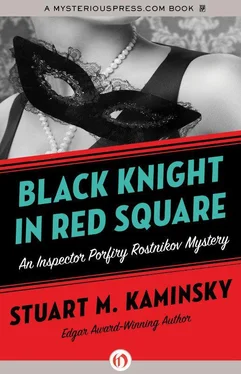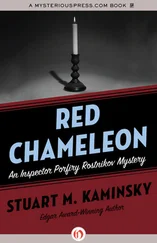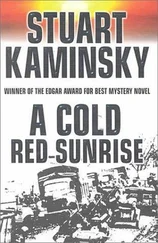Stuart Kaminsky - Black Knight in Red Square
Здесь есть возможность читать онлайн «Stuart Kaminsky - Black Knight in Red Square» весь текст электронной книги совершенно бесплатно (целиком полную версию без сокращений). В некоторых случаях можно слушать аудио, скачать через торрент в формате fb2 и присутствует краткое содержание. Год выпуска: 1983, ISBN: 1983, Издательство: Fawcett, Жанр: Полицейский детектив, на английском языке. Описание произведения, (предисловие) а так же отзывы посетителей доступны на портале библиотеки ЛибКат.
- Название:Black Knight in Red Square
- Автор:
- Издательство:Fawcett
- Жанр:
- Год:1983
- ISBN:9780804104050
- Рейтинг книги:5 / 5. Голосов: 1
-
Избранное:Добавить в избранное
- Отзывы:
-
Ваша оценка:
- 100
- 1
- 2
- 3
- 4
- 5
Black Knight in Red Square: краткое содержание, описание и аннотация
Предлагаем к чтению аннотацию, описание, краткое содержание или предисловие (зависит от того, что написал сам автор книги «Black Knight in Red Square»). Если вы не нашли необходимую информацию о книге — напишите в комментариях, мы постараемся отыскать её.
Black Knight in Red Square — читать онлайн бесплатно полную книгу (весь текст) целиком
Ниже представлен текст книги, разбитый по страницам. Система сохранения места последней прочитанной страницы, позволяет с удобством читать онлайн бесплатно книгу «Black Knight in Red Square», без необходимости каждый раз заново искать на чём Вы остановились. Поставьте закладку, и сможете в любой момент перейти на страницу, на которой закончили чтение.
Интервал:
Закладка:
It was a toss-up as to whom he was more afraid of, the woman on the phone or the Russian police. He was still looking at his face in the mirror, marveling at its composure, when someone knocked on the door. Behind him he heard Alexander get up from his studies, cross the room, and open the door. Behind him he heard the voice say, “I’m Inspector Tkach of the MVD. I would like to talk to Mr. James Willery.”
Willery’s command of Russian was not much of a command. It was more of gentle plea. He had understood the word “inspector” and the name Tkach, but the rest escaped him.
Then Alexander Platnov introduced Willery to the young policeman. After an unsuccessful attempt to converse in Russian, they decided to speak French, a language neither was terribly comfortable with, but which they could control.
Tkach wondered whether the Englishman was incredibly nervous or whether he behaved this way all the time. A glance at the Russian student told Tkach nothing. Was talking to a policeman sufficient to start this thin Englishman’s pale hands trembling? Was there something else making him nervous? Tkach decided to push. As far as he was concerned, he had failed in his interrogation of Monique Freneau. He felt that he could have gotten more out of her if he had handled the questioning another way. If he could have spoken to her in Russian, he would have done better. Now he and this strange Englishman were on neutral ground in French. Tkach would not let this one get away.
To establish his direction he politely but firmly asked Platnov to leave the room. Willery looked as if he might protest, but Tkach turned a cold eye on him, trying to imitate Karpo. Platnov left the room with a sullen scowl, Willery withdrew his resistance, and Tkach moved forward to advance his control of the situation.
Tkach pointed to the chair Platnov had vacated, and Willery dutifully sat down with the detective standing over him. Tkach would have liked to open his collar, loosen his tie, even pace around, but he stood looking down at the Englishman, whose face held a fixed smile betrayed by a few drops of sweat on his brow.
“Mr. Willery,” Tkach began, referring to his notebook as if he had a series of important questions written there, “you were interviewed on Tuesday by an American journalist, Mr. Aubrey, were you not?”
“Yes,” said Willery. “Not the most cheerful person. Don’t know why he singled me out.”
“What did he talk to you about?” Tkach went on, acting as if he could see through Willery’s tinted glasses.
“My career, my films. He said he was doing a series on different directions of film in different countries, and he wanted me as an example. I had the distinct impression that he was going to ridicule me. My films are, after all, not terribly accessible to the average film-goer, and the ignorant can easily cast stones.”
“I have not seen any of your films,” said Tkach humorlessly.
“Fantastic,” bleated Willery. “My latest film, To the Left , is being screened tonight, at the Zaryadye. I’ll give you a pair of tickets.”
Willery had stood up and was nervously searching his jacket pocket. He found the tickets, peeled off two, and handed them to Tkach, who took them. To accept a gift might destroy his command of the situation, but the temptation was too great. Free tickets to an international movie for himself and Maya. He considered asking for one for his mother, and Willery responded as if he had read Tkach’s mind.
“Would you like another?” he said warmly.
“Yes,” said Tkach. “I would appreciate it.”
And Willery peeled off another. Tkach now had the impression that he could ask for dozens of tickets and the nervous Englishman would keep supplying them. What Tkach did not know was that word of mouth on To the Left was far from favorable. The theater would not be as jammed as it was for most screenings during the festival.
Tkach pocketed the tickets and again motioned for Willery to sit, which he did with an almost boyish enthusiasm, a kind of overeagerness to cooperate that made Tkach all the more suspicious. The detective pushed a wisp of straight hair from his eyes and pressed on.
“Mr. Aubrey has been murdered,” Tkach said.
“Sorry to hear that,” replied Willery, who showed not the slightest trace of sorrow, though something like concern did come into his eyes.
“And a French producer named Monique Freneau has also been murdered,” Tkach pressed on. “You knew her?”
Tkach had no doubt now. Willery was in a state of great agitation, which he tried to cover with his broad smile.
“Name is a bit familiar,” he said, biting his lower lip as if trying to recall, “but…I’m sorry.”
“And,” Tkach said stepping closer to Willery, “I suppose you have never heard of World Liberation?”
“I…well…perhaps,” Willery said, adjusting his dark glasses, which needed no adjustment. “I meet so many people in so many different organizations all over the world.”
It is time, Tkach thought. It was worth the chance. He could always fall back if he failed, but he figured that the Englishman was too far off balance to mount a decent counterattack.
“Mr. Willery,” Tkach sighed, imitating Porfiry Petrovich’s tone, “we have clear evidence that you are well acquainted with members of the organization known as World Liberation. We also know that Mr. Aubrey interviewed you because of your connection to that terrorist organization and that you are in Moscow because of your affiliation with them.” Though Tkach knew none of this he snapped his notebook shut and squinted at the man before him. It would have helped if his face were harder, but it seemed to be doing the job.
“Good Lord,” Willery cried. “I’ve talked to…I mean I’ve met a few of them in-I think it was Berlin…but Aubrey never asked about World Liberation. As for me being here because…that’s absurd. My film was accepted, invited. Look, I want to cooperate with the police, but you’ve got this all wrong.”
Tkach said, “I am just a policeman investigating a series of murders. There are people in another branch of our government who might be less sympathetic in dealing with you. Do you follow?”
“I…yes,” gulped Willery, looking to the door for help that would not come.
“That branch of the government located a small band of World Liberation members in Moscow this morning,” Tkach said, “and eliminated them as all terrorists or violent subversives who threaten our nation are eliminated.”
Tkach had put as much fervor as he could into this statement though he felt little of the zeal. Karpo would have meant it, but Tkach prided himself on his acting, and now he was playing the role of the dedicated Marxist police officer. He did not know that every new disclosure of the death of someone involved with World Liberation was another persuasive argument for Willery to do what the woman on the phone had told him to do. Willery’s very life was at stake. The most the MVD or KGB could do to him was prison, he reasoned, possibly with a bit of psychological or even physical torture. He could probably survive that; he might even beat the accusation with sufficient pressure from the British government.
“That is a reasonable position to take,” Willery finally said with a dry throat, not feeling at all cunning.
“Enough,” said Tkach. “You know what I need and want. We do not want any more dead people.”
“Meaning me?” Willery said, touching his thin chest.
Tkach nodded in sad agreement.
“I have nothing to do with World Liberation,” Willery said with a laugh. “This is absurd. I make films. No one is going to kill a filmmaker, an artist.”
“I hope not,” said Tkach, putting his notebook into his pocket. “I should hate to be the one to have to examine your body, especially if it looked anything like that of Monique Freneau. She had been…but you do not need to know about that. I’ve taken enough of your time. I thank you for the tickets.”
Читать дальшеИнтервал:
Закладка:
Похожие книги на «Black Knight in Red Square»
Представляем Вашему вниманию похожие книги на «Black Knight in Red Square» списком для выбора. Мы отобрали схожую по названию и смыслу литературу в надежде предоставить читателям больше вариантов отыскать новые, интересные, ещё непрочитанные произведения.
Обсуждение, отзывы о книге «Black Knight in Red Square» и просто собственные мнения читателей. Оставьте ваши комментарии, напишите, что Вы думаете о произведении, его смысле или главных героях. Укажите что конкретно понравилось, а что нет, и почему Вы так считаете.












